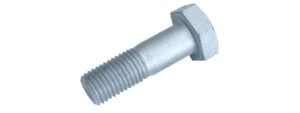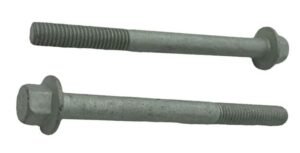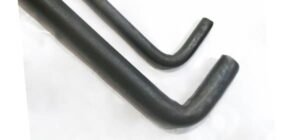In machine design and manufacturing, fastener threads are a vital element that determines how components connect. There are two main types of threads: coarse threads and fine threads. Understanding their different characteristics is critical to selecting the correct bolt thread type for a specific application.

What are the commonly used specifications for threads?
Threads are defined by pitch, diameter, and number of threads, commonly specified in both Metric threads (measured in millimeters and represented by “M” (e.g., M8)) and imperial threads (measured in inches, and include Unified Thread Standard (UTS) with coarse thread (UNC) and fine thread(UNF))
Common Imperial Threads Thread Types: Coarse threads (UNC Thread ) and Fine threads(UNF Thread)
What is Coarse thread (UNC Thread ) ?
Coarse threads (also called standard threads) are a type of thread on fastener bolts, screws, and nuts, that are characterized by a wider pitch between the threads, The most common thread type used in general fastening applications, coarse thread is the default selection unless otherwise stated.
For example:
- Coarse Thread( Unified National Coarse Thread ): A 1/4-20 bolt is 1/4 inch in diameter and has 20 threads per inch, a common example of coarse thread, therefore expressed as 1/4-20UNC.
- Fine Thread( Unified National Fine Thread ): Conversely, a 1/4-28 bolt is also 1/4 inch in diameter but has 28 thread per inch, so classifies it as a “fine” thread, therefore expressed as 1/4-28UNF.
Applications of Coarse thread or UNC Thread:
Coarse threads are stronger and more resistant to dirt and damage, making them suitable for general fastening applications. They are easier to assemble and disassemble, which is beneficial in environments that may require frequent removal and replacement of fasteners.
- Construction: Used in building frames, coarse-threaded bolts provide strong hold and easy installation.
- General Manufacturing: Used in applications where quick assembly is required or where threads may be exposed to dirt and debris.
- Outdoor Machinery: Agricultural equipment and garden machinery often use coarse-threaded screws for easier maintenance and better resistance to rust and corrosion.
- Electronics: Applied where components require frequent adjustments or maintenance.
- Automotive Industry: Used in car manufacturing for components that require regular maintenance and are exposed to environmental factors.
What is Fine thread (UNF Thread)?
Fine threads have a smaller pitch in thread compared to coarse threads, therefore have a higher number of threads per unit length.
Applications of Fine Thread or UNF Thread:
Fine threads are often used in applications where precision is key. Because of the thread depth is shallower, stripping is less likely to occur and allows for more precise tightening. Here are some industries where fine threads are essential:
- Aerospace: Because of fine teeth have higher strength and better fatigue resistance, they are widely used in engine parts and airframe components in the aerospace industry.
- Automotive: In automotive components that require tight tolerances, such as in engine bolts and suspension mounts, fine threads provide the necessary precision and strength.
- Precision Instruments: Fine threads are ideal for applications requiring high precision, such as optical equipment, microscopes, and measuring instruments, where small adjustments can have a big impact.
Understanding these basic principles of fine vs. coarse thread will help ensure you choose the right type of fastener for your specific needs, enhancing both the efficiency and durability of your projects.
What are the difference between coarse and fine thread bolts?
Below is a comparison table of the advantages and disadvantages of coarse thread bolts and fine thread bolts:
| Feature | Coarse Thread | Fine Thread |
|---|---|---|
| threads per inch | Wider thread spacing | Closer thread spacing |
| Engagement | Less engagement; faster to screw in | More engagement; stronger hold |
| Material Suitability | Better for soft materials like wood and plastic | Better for hard materials like metal |
| Strength | Generally less strong due to fewer threads per inch | Stronger due to more threads per inch |
| Resistance to Stripping | Higher risk of stripping in hard materials | Lower risk of stripping, better for brittle materials |
| Ease of Use | Easier to start and faster to install | Can be more difficult to start, especially by hand |
| Vibration | More susceptible to vibration loosening | Less susceptible to vibration loosening |
| Durability | Less durable in high vibration environments | More durable and resistant to vibration loosening |
How do I choose a thread type?
Choosing the right type of thread—fine or coarse—depends on the specific requirements of the project, including the load, the materials involved, and the environment of the assembly operation. Understanding these specifications can help ensure that every connection is safe and durable.






